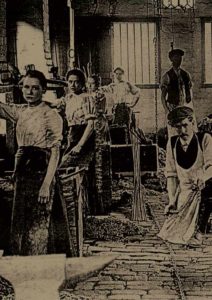 During the 19th century, the Black Country, and especially the area centred on Cradley Heath, became the centre of chainmaking in England. Fuelled by the industrial revolution, demand grew apace for all kinds of chains – from massive anchor chains to dog leads. Some of the metalwork from this huge region would have undoubtedly found its way into the transatlantic slave trade over the time that this trade in humans was so brutally and cruelly taking place. Heavy and medium chains were made by men in factories – the anchor and chain for the ill-fated Titanic were made in this way – but lighter chains were made by women and children, typically in dark, cramped outhouses behind their homes. The women endured a double burden as they were housewives whose chainmaking came on top of cleaning, shopping, cooking, and looking after children.
During the 19th century, the Black Country, and especially the area centred on Cradley Heath, became the centre of chainmaking in England. Fuelled by the industrial revolution, demand grew apace for all kinds of chains – from massive anchor chains to dog leads. Some of the metalwork from this huge region would have undoubtedly found its way into the transatlantic slave trade over the time that this trade in humans was so brutally and cruelly taking place. Heavy and medium chains were made by men in factories – the anchor and chain for the ill-fated Titanic were made in this way – but lighter chains were made by women and children, typically in dark, cramped outhouses behind their homes. The women endured a double burden as they were housewives whose chainmaking came on top of cleaning, shopping, cooking, and looking after children.
This lighter chain was known as ‘hand-hammered chain’ or ‘country-work chain’ as it was often sold to farmers who had many uses for it, such as for rabbit traps, tethering animals and harnessing horses to ploughs and carts. There was heavy demand for this kind of chain in the era before mechanisation, when the army required chain for its horses and wagons, as did mine owners whose pit ponies hauled trucks of coal underground. The chain was also used to fetter convicts.
The women relied on a go-between known as a middleman or ‘fogger’ – a man or woman who handed out the work sub-contracted by larger manufacturers and delivered rods of iron two to three metres long to the women’s homes. They would have a small forge in an outhouse where they welded each link by hand, working with the most basic of tools, usually a hammer and a pair of tongs. It was hot and dirty – and very poorly paid.
The foggers collected the finished chain and took a percentage of the money the manufacturers paid, usually 25 per cent. A woman would have to work 12 to 13 hours a day, hammering up to 5,000 links a week to earn 4s to 5s (20p to 25p). The women were paid piece rates, that is, on the amount and weight of chain they produced. Homeworkers had little choice but to accept what the fogger offered. The alternative was starvation.